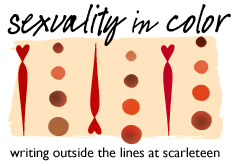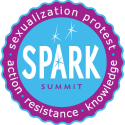 Sade is 17 and works as a youth activist for YWCHACexternal link, opens in a new tab, a program for and by young women of color that helps foster their development in advocacy training while providing them with the skills to be effective peer-educators to youth on the subject of sexual health. Their mission is to address the increasing rates of HIV infection in young women of color ages 13-24. Sade does a lot of community outreach and events that help develop partnerships with individuals and organizations that have similar goals, events like annual sexual health summits, safer sex education parties, advocacy and STD (STI) workshops, and other community projects.
Sade is 17 and works as a youth activist for YWCHACexternal link, opens in a new tab, a program for and by young women of color that helps foster their development in advocacy training while providing them with the skills to be effective peer-educators to youth on the subject of sexual health. Their mission is to address the increasing rates of HIV infection in young women of color ages 13-24. Sade does a lot of community outreach and events that help develop partnerships with individuals and organizations that have similar goals, events like annual sexual health summits, safer sex education parties, advocacy and STD (STI) workshops, and other community projects.
I got the chance to ask Sade about what she does, why she does it, and what she thinks about some of the issues that impact HIV and young women. I’ve shortcut my own questions to give her words the spotlight, because she’s got some phenomenal things to say that so many people really, really need to listen to.
On what she wants people to know about young women and color and HIV: I feel that people need to know that their health should always be top priority. The sad thing about doing this work is that many people don’t even know what HIV or AIDS stands for or how, where or how often to get tested. Some adults don’t even know how to use condoms. But that’s why we exist: we care. I feel that as young women of color we need to start caring about our bodies and our image because if don’t care for ourselves no one will. But first we have to create a system where there are sexual health resources for all teens. When you look at the statistics it shows that black and Hispanic women are 29% of NYC female population and together we represent 86% of NYC women living with HIV/AIDS. So the main thing that I want to get across is that prioritizing is the key to fighting this disease.
On what she feels the biggest barriers are for young women of color when it comes to HIV, with prevention, treatment and the whole context of their lives, particularly taking the impact of institutionalized racism into account: I believe the biggest barrier for us to overcome, combined with our sociopolitical status, is the lack of resources we have in communities of color. This does not only stand for protection against STDs but in all other aspects of our lives. We, as women and as people of color, are disproportionally underrepresented and we lack a sufficient understanding of what we need and what we have a right to. How are we supposed to know what’s wrong if we don’t know what’s right? I feel that the best way to tackle this is by having a voice and mobilizing with people who have bigger voices. If we knew what we should have then we wouldn’t settle for less and that’s what it’s all about. We need to make sure that we are heard and our needs are being met.
On what messages she feels young women need to be getting about HIV: Young women need to understand that our bodies are our temples and just like we would treasure a gift that we’ve waited so long for, we need to treasure our bodies 100 times better. Young women need to understand that HIV is not a foreign disease and not a gay disease. There are a lot of stigmas associated with HIV infection. I feel that this misconception comes from the media where the science and health channels only depict Africa or some other third world country as plagued with HIV/AIDS, when in fact, NYC is plagued just as well with the disease. There is a lack of sex education even our health teachers in school have on this subject. Many people still walk around with the “1980’s mentality” that HIV can only infect gays and you can tell a person has HIV based on appearance.
On how cultural and media messaging impacts girls, their self-care and HIV: I definitely feel that the media plays a big role in the way we view ourselves, the way we treat our bodies and the way we allow others to treat us. Many of us don’t like to admit it, but we are impressionable and naïve. The media preys on this by distorting our view on priorities, between right and wrong, and ultimately our value systems. They teach boys that it’s okay to demean women and they teach girls that it’s okay to be demeaned. We are forced to be submissive and conform to gender norms that teach us to put ourselves second. And here is when priority becomes distorted and our sexual health falls by the wayside. It’s all about prioritizing.
On being an activist in this arena: The work has been great! Although there are times when I feel defeated or worn out. At the end of the day, it’s the gratification of knowing that I’m just not doing something to help someone else but I am potentially changing things for myself and others like me. That’s what motivates me - to know that I’m representing a whole class, gender, and race of people that may not be as fortunate to have the resources I have to do the outreach and to be liberated. As far as challenges, I don’t face many challenges in my line of work. I find that people seem open-minded and respectful to a young black female teenager who is knowledgeable and passionate.
On getting started as a young activist: If another young person would want to take action like I have, I’d say ask around for organizations or programs that mobilize on the issues that you’re interested in and if it seems like you can’t find one, or if you’re the radical type, then start your own. You’d be surprised to know how effective and successful many youth-led and youth-run organizations are.
On envisioning and imaging a better world: I honestly don’t like thinking about my ideal world because when I do I become more open to all the other issues that people have to deal with on a day to day basis. It kind of makes me depressed. However, I do like anticipating a day when a new policy is passed that is a reflection of my hard work. When I look forward to my small goals, it motivates me to go further and deeper into my advocacy and outreach.
 This post is part of the blogtourexternal link, opens in a new tab for the SPARK Summitexternal link, opens in a new tab, happening in New York on October 22nd. Tomorrow’s stop on the tour is at Our Bodies, Ourselvesexternal link, opens in a new tab. SPARK – Sexualization Protest: Action, Resistance, Knowledge – is both a summit and a movement designed to push back against the increasingly sexualized images of girlhood in the media and create room for whole girls and healthy sexuality. SPARK engages teen girls as part of the solution. The Summit works with and highlights girl leaders and activists to jump start an intergenerational movement.
This post is part of the blogtourexternal link, opens in a new tab for the SPARK Summitexternal link, opens in a new tab, happening in New York on October 22nd. Tomorrow’s stop on the tour is at Our Bodies, Ourselvesexternal link, opens in a new tab. SPARK – Sexualization Protest: Action, Resistance, Knowledge – is both a summit and a movement designed to push back against the increasingly sexualized images of girlhood in the media and create room for whole girls and healthy sexuality. SPARK engages teen girls as part of the solution. The Summit works with and highlights girl leaders and activists to jump start an intergenerational movement.
